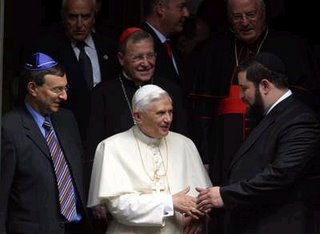"In our world today religious, political, academic and economic leaders are being seriously challenged to improve the level of dialogue between peoples and between cultures. To do this effectively requires a deepening of our mutual understanding and a shared dedication to building a society of ever greater justice and peace. We need to know each other better and, on the strength of that mutual discovery, to build relationships not just of tolerance but of authentic respect. Indeed, Jews, Christians and Muslims share many common convictions, and there are numerous areas of humanitarian and social engagement in which we can and must cooperate.

"The Vatican Council II Declaration Nostra Aetate reminds us that the Jewish roots of Christianity oblige us to overcome the conflicts of the past and to create new bonds of friendship and collaboration. It affirms in particular that the Church deplores all forms of hatred or persecution directed against the Jews and all displays of anti-Semitism at any time and from any source."
These remarks, neither accidentally, nor incidentally, bear close resemblance to the core of his remarks at Regensburg last month. Today's remarks hearken back to the core of the Regensburg lecture, about which I posted earlier this week. It is certainly worth re-posting this core statement, in which the Holy Father prescinds from the fact that the vast majority of the earth’s over 6 billion people are deeply religious and that their cultures and societies are deeply rooted in their religions. These religions comprise the five great traditions, which, chronologically are: Hindu, Buddhist, Judaism, Christianity, and Islam. Many of these peoples, Eastern Christians included, view the West and its secularizing and immoralizing reach as a threat to their ways of life. It is this false gap that has developed between faith and reason Pope Benedict seeks to bridge when he said in his lecture last month that the West must overcome "the self-imposed limitation of reason to the empirically falsifiable" that "we become capable of that genuine dialogue of cultures and religions so urgently needed today. In the Western world it is widely held that only positivistic reason and the forms of philosophy based on it are universally valid. Yet the world's profoundly religious cultures see this exclusion of the divine from the universality of reason as an attack on their most profound convictions. A reason which is deaf to the divine and which relegates religion into the realm of subcultures is incapable of entering into the dialogue of cultures."
In order to make some links between posts on this blog and, hopefully, bring some coherence to various observations, I offer a passage from Turkish author, Orhan Pamuk’s novel, Snow, which I recommended in my post Middle Eastern Sources, as a case-in-point from literature, which is a privileged gateway into any culture, of what the Holy Father is trying to communicate to the secularized and increasingly irreligious West. I read this last evening and was struck by how well Pamuk captures this real, but unnecessary, tension that seems to be rending the world apart. In an arguable case of synchronicity, just as I was typing this, at 10:16 am, I learned that Pamuk has been awarded this year’s Noble Prize for Literature, an honor richly deserved.
In this dialogue, from Snow, Pamuk masterfully shows, in a way unique to literature, the gap of which the Holy Father speaks of as needing to be closed, or at least narrowed. Ka, the main character in the novel, an agnostic, secularized Turkish poet, who has lived for many years in Frankfurt, Germany, is on a journalistic assignment in the remote northeastern Turkish town of Kars, represents Western reason in this dialogue. Whereas, Kadife, the recently Islamicized sister of the woman with whom Ka has fallen in love, takes the side of faith. Of the two, Ka comes across as the more shallow and predictable.
While walking with Kadife, Ka indirectly referring to the matter on which he is in Kars to report for a major Istanbul newspaper, the suicide of a local girl, Teslime, who killed herself instead of adhering to a governmental rule barring female students from state-run colleges from wearing the Islamic headscarf, the hijab: "I’m new to Kars . . . Even as I come to understand how things work here, I’m beginning to think I’ll never be able to make it clear to anyone on the outside. My heart breaks to see these people’s fragile livelihoods and their needless suffering." To this plaintive statement, Kadife responds: "The only people who worry about needless suffering are atheists who’ve never suffered a thing." She continues, "Because, after all, it takes only the tiniest discomfort for atheists to decide that they can’t bear life without faith anymore, and the next thing you know they’ve returned to the fold," thus making their conversation an intense one. Ka continues the dialogue by directly addressing the matter of the suicide of Kadife's classmate and friend by saying, "But Teslime’s suffering was so great that she left the fold and committed suicide." To this Kadife confidently gives a reply that Ka, the agnostic secularist does not expect. Why does her answer this surprise Ka?

I think it surprises him because it is not the silly, pat, poorly thought out, cut-and-dry answer that a person, such as Ka, expects from a provincial and religious person, like Kadife. She replies: "Well, if Teslime did indeed kill herself, it’s possible to say she committed a terrible sin. If you turn to the twenty-ninth line of the Nisa verse of the glorious Koran, you’ll see that suicide is clearly prohibited. But the thought that she might have sinned and killed herself is nothing next to the love we feel for her; there is still a corner of our hearts where we remember her with deep love and affection."
Not believing what he is hearing, Ka says, "So you mean to say that even if this luckless girl committed an insult against our faith," he calls it "our faith" apparently as a ploy to gain sympathy from Kadife, who is not fooled by such cleverness, "we still love her . . . We don’t believe in God with our whole hearts anymore," continues Ka. Getting to the point I am trying to make, Ka says, continuing the previously quoted sentence, "we no longer need to, because now, as in the West, we confirm our beliefs by reason and logic." He asks Kadife "Is this what you’re saying?"
Kadife gives another unexpected answer, "The Holy Koran is the word of God, and when God makes a clear and definite command it’s not a matter for ordinary mortals to question." She is not done, "But do not assume from this that our religion leaves no room for discussion. I will say only that I’m not going to discuss my faith with an atheist, or even a secularist." She concludes by shouting across the distance that separates faith from reason, "I’m not one of those Islamist toadies who go around trying to convince secularist that Islam can be a secular religion." (Snow, pgs. 112-113 in the Vintage paperback edition).
To honor Orhan Pamuk, Noble Prize winner, and to give yourself the treat of reading a great novel that takes you into another culture, go and read Snow. You won't be disappointed!


No comments:
Post a Comment